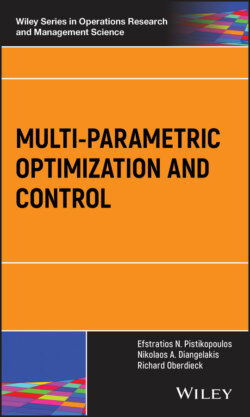Читать книгу Multi-parametric Optimization and Control - Efstratios N. Pistikopoulos - Страница 32
Theorem 1.1 (Basic Sensitivity Theorem, [1])
ОглавлениеLet a general multi‐parametric programming problem be described by (1.16). Assume that the functions defining problem (1.16) are twice differentiable in and their gradients with respect to and the constraints are once continuously differentiable in in a neighborhood of . In addition, assume that the second‐order sufficient conditions for a local minimum of the problem hold at with associated Lagrange multipliers and . Lastly, let the gradients (for such that ) and be linearly independent (i.e. LICQ holds), and for such that , i.e. strict complementary slackness (SCS) holds.
Then, the first‐order sensitivity results for a second‐order local minimizing point are known as the basic sensitivity theorem (BST), and the following properties hold:
is a local isolated minimizing point of the problem and the associated Lagrange multipliers and are unique.
For in the neighborhood or , there exists a unique, but continuously differentiable vector function satisfying the second‐order sufficient conditions for a local minimum of the problem with associated unique Lagrange multipliers and .
For near the set of binding inequalities is unchanged, SCS holds and the binding constraint gradients are linearly independent at .
